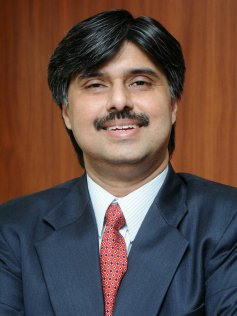Rajeev Karwal – Founder & Chairman of Milagrow Robots & Shahzad Ahmed – Chairman & CEO at Blue Ocean Global, spoke to Anita Joseph, Editor at Reseller ME, about how consumer robots are taking the world by storm.

Tell us more about Milagrow Robots-what is the market reaction to these “consumer robots?”
Rajeev: Milagrow Robots was founded in 2007 and has been a robotics brand since 2011. We have the largest range of robots in the world under our brand name. We have floor cleaning robots, window cleaning robots, wall cleaning robots, air duct cleaning robots, pool cleaning robots, lawn mowing robots, we have humanoids, education robots, plus robotic components. The consumer segment is dominated by the floor cleaning robots, and also window, floor and pool cleaning robots. In the industrial segments, there are two industries that have taken extremely well to us, that is, the facilities management and the hospitality industry. In the last one year, the growth of these robots has been multi-fold. We ourselves grew fivefold, i.e, 500% over the previous year. Now that the offices are slowly opening up, we are seeing great traction in key industries such as healthcare, museums, airports, educational institutions, real estate and smaller restaurants, even office canteens.
Why do you think there’s a sudden spurt in demand for robots in the market?
Rajeev: The pandemic brought in varying degrees of a total lockdown. And when a lockdown happens, there is a severe restriction on movement and people are not able to go to out. We all know that homes need cleaning-that’s one of the most important aspects. So, when people realize that there are robots that can do these tasks, they try and get hold of one. People are now becoming more and more aware of the benefits of robots to take care of everyday tasks. One year ago, there were no robots in any of the retail outlets or large format stores. But today, you’ll find most stores keeping one or two brands. We feel utility is driving the demand for robots.
What does the company’s entry into the Middle East market mean? What are your expectations?
Rajeev: Milagrow Robots was set up with the notion that one human being should not serve another human being for menial domestic tasks. Crucial manpower should be more involved in important tasks that contribute to the society and not menial chores. If we reskill this group of people, they can contribute much better to society and to the economy. It is Milagrow Robots’s global mission to eliminate humans doing menial activities. This principle applies to every new market we enter into.
There’s another fact that Milagrow Robots believes in: that robots can be humans, but humans can never be robots. For tasks that are repetitive, for tasks that require a huge degree of precision and effectiveness and are time-bound, robots are ideal and they bring in tremendous value. They also bring in huge return on investments over a period of time. This can be as high as 4,000% to 5,000%. The payback period for the investments can be between 4-5 months in most cases. So, why will somebody not tap into this huge opportunity and make the necessary investments? We see a tremendous possibility in the Middle East, for robotic adoption and we have made many, many changes in our products to suit the global market environment today. For instance, all our floor cleaning robots can take Sodium Hypochlorite 1% which kills Covid spores on the floor, all our robots have HEPA 12 filters which can filter out the Covid virus and all our robots are IoT devices which can be used by customers sitting in the comfort of their homes and it helps us do trouble shooting for our customers, instead of visiting them physically at their homes, which helps in social distancing during this time of the pandemic. We are also able to advise our customers remotely about any problems they may face, and the possible solutions.
We have incorporated a lot of changes and customers find it extremely useful and convenient. All of our surveys tell us that brands which do well in public emergency situations like the pandemic, are brands that provide safety, security and hygiene to the customers, which is proving to be true.

With digital transformation on the fast-track, how are Milagrow robots helping to close the gap between humans and technology?
Rajeev: That’s one of the key things these robots do. For instance, imagine buying a floor cleaning robot. You would want this robot to map the floor area by itself, you’d want it to map the cleaning by itself, and you’d want it to have real-time movements, all by itself. You would not want it to go into other areas of the home and disturb the arrangements there. For instance, when the robots climb on top of a carpet to clean it, it should fold its wet mop as not to dirty the carpet. You would also want it to mop the floor with added pressure and also pay particular attention to the corners, like humans do. You would also prefer the robots to self-wash its mops once cleaning is done. Our latest robot, which we are going to launch soon, has all of these features. It even has a self-mop cleaning function with 40 Newtons of pressure with two water tanks-one is a clean water tank, and one is a dirty water tank. It has two hydraulic shafts which push the mop firmly on the floor to clean stubborn dirt. These are exactly what any household requires when using a robot mop. In fact, if you study the needs of the customer well, there is nothing that robotic technology cannot do. But the only challenge which we find the robot may not be able to do, is have a sense of empathy, which would make it anticipate different needs and react intuitively to situations around.
If you look at the Milagrow Robots logo, it is a heart and the division’s original name is Milagrow Human Tech, and that is because we believe that technology must create products that are humane in nature and make it easier for people to lead their lives. We aim to introduce best-in-class and well researched products into the market.
You’ve signed Blue Ocean Global as distributors for the region. What does this partnership mean for the market?
Shahzad: As a company, Blue Ocean Global is a little different in its approach, in the sense that we don’t just look at one specific country. We are a global master distribution company, and we operate in nearly 40 countries across the Middle East, Africa, Asia Pacific, Australasia and Europe. Milagrow Robots and Blue Ocean Global share the same vision- that they are looking at a global level in terms of brand positioning, and our distribution strategy is also on the same lines. We synergize quite well in that direction. So, we’ll start with the Middle East, but will eventually move worldwide, including Europe. The interesting thing about the Middle East is that it has a very young population and so it is open to technology adoption much faster. We’re talking to some of the partners like Amazon and Noon, as well as the typical electronic retail stores which adopt this technology quickly and we find that this is a growth area that is fast paced right now for reasons we all know. So, we have the ability to move this brand into all the four verticals-online, retail, B2B and the institutional level.
Rajeev: Milagrow Robots understands technology, Milagrow Robots understands branding and the various products that can make a difference in the market. Blue Ocean Global understands the go-to market strategy much better than us in this part of the world and many other areas globally, and we hope that after our initial success in the Middle East market, we will further strengthen our partnership into other areas globally. Milagrow Robots has opened its first office in DAFZA, Dubai and we hope that our partnership will grow from strength to strength in the coming months. We’re looking at this partnership from a long-term perspective, especially because the value systems of the two organizations match perfectly. We’re taking it gradually, we don’t want to rush into the market in such a way that we spoil the market for others, we want a strong investment in the market. Robots is one category which is all-pervasive-we believe that in the next 10-12 years, there will be 5-10 robots in each house, to tackle different tasks. Blue Ocean Global is also aware of it. Together, we know that we’re not here to arrive with a bang and set the market on fire. We are committed to this growing category of robots which is set for dramatic growth in the near future, in multiple areas of customer requirements.
Finally, what are your growth plans and strategies for the dynamic, fast evolving Middle East market?
Shahzad: We would like to plant a robot in every house-that’s our strategy. And to make that happen, we obviously need a game plan. Let’s look at an example: operators such as Etisalat and Du could be worth a tie-up since they are part of every home. One of the brands that we have right now is called Gigaset and we’ve been planting this cordless phone into every home. In the last five years, we’ve planted nearly two-and-a-half million phones, which basically means two-and-a-half million houses, through such telephone operators. This means that our strategy will evolve as we go along-it is evolving all the time. There’s going to be a retail part, an online part and even an operator part in this strategy. Every channel is looking for new products and new ideas that resonate with the customer. Our job as a distribution house, is to resonate with these various distribution points and get into the homes and offices of every individual. We are seeing robots happen as a global trend-just to give an example, a single SKU of one of the robots in the US is selling over 150,000 numbers in a month! It’s growing massively and you can imagine where it’s headed! For this growth to be replicated here, obviously it will take time, so what is required from our side is patience and the long-term vision to capture the market.
Milagrow Robots is one of the first few robotics companies to come to this part of the world and set up an office here. Even today, some of the major players in this segment are not present here-not even the biggest ones. That is the kind of thinking we have-that to understand a market, you need to have physical presence there and understand the customers, the various trends and the local requirements-basically, what works and what doesn’t. We’ve been looking into all of these, and so are extremely confident that the brand will do very well over a period of time.


